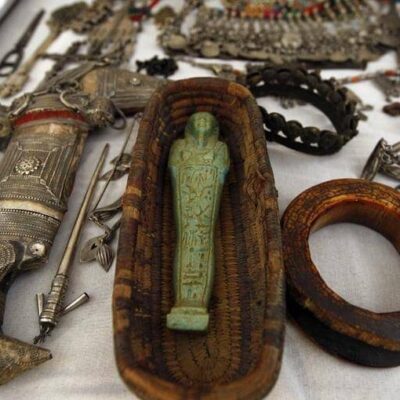Antique smuggling


Antique smuggling and the crime of antique smuggling
It is one of the most important economic crimes in the country. Since antiques are part of the national wealth of any country, it means that they belong to all the people of a land and no private person has the right to own, buy or sell them except with the permission of the law, so their entry and exit from the country is also monopolized by the government. Therefore, if private individuals attempt to leave the country illegally and smuggle antiques will be considered a crime according to the law punishing of those who disrupt the economic system and will be subject to the legal punishment provided in this law.
In general, smuggling is the importation or exportation of goods that are prohibited from entering or leaving the country or are monopolized by the government. Such as medicine, currency, organs, alcohol and…. In other words, some goods are either banned from entering or leaving due to their special conditions, or are monopolized by the government or by persons authorized by the government.
One type of goods that is generally criminal and prohibited in the country, such as drugs, alcohol, etc. The second category are goods that, due to their importance, are only in the possession of the government, such as weapons, drugs and… are called smuggled goods and the people who are engaged in this work are called smugglers.
But specifically in connection with the smuggling of antiques, the law punishing those who disrupt the economic system, has provided an article that is useful in providing a definition of this crime.
According to Article 1 of this law: The removal of cultural heritage or national wealth, even if it does not lead to its removal from the country, is considered smuggling and all discovered and the relevant property is confiscated in favor of the government.
Therefore, according to this law, antiquities smuggling can be defined as follows:
Attempting to take national wealth, including antiques, out of the country, even if it does not lead to its departure. But what exactly does antique mean and what objects are called antique? We will deal with this issue in the following.
Definition of antiques
Basically, historical and ancient objects are called antiques. But in Iran, these objects are divided into two categories. The first group are those that are related to before the Safavid period and the second group are those that are related to the post-Safavid period.
Those belonging to the pre-Safavid period are monopolized by the state because they are considered Bastalni monuments and the national heritage of the country, but those belonging to the post-Safavid period, ie recent centuries, do not belong exclusively to the state and may belong to private individuals and is considered the works of art.
Therefore, in the discussion of antiquities smuggling, we often deal with objects that are related to the pre-Safavid period. In the following, we will discuss the conditions and elements of committing the crime of antiquities smuggling.
Under what circumstances is antiquities smuggling a crime?
Basically, for an act to be a crime under our law, it must have three elements: legal, material and psychological. We first provide a general and concise explanation of each of these elements, and then examine the elements of the crime of antiquities smuggling in particular.
A) The legal element of the crime of antiquities smuggling: The legal element means that an act is a crime if it is punishable by law. Therefore, if an act, although forbidden and disgusting, is not criminalized in the law, it cannot be considered a crime, such as suicide, which, although is forbidden and condemned, is not a crime because it is not punished in our law. The crime of antiquities smuggling is criminalized in two laws.
- According to Article 561 of the Islamic Penal Code adopted in 2013:
Any attempt to remove historical-cultural property from the country, even if it does not lead to its removal, is considered smuggling and the perpetrator will be sentenced to one to three years in prison in addition to returning the property and paying a fine equal to twice the price of the smuggled property.
- Pursuant to Article 1 of the Law on Punishment of Disruptors of the Economic System:
The removal of cultural heritage or national wealth, even if it does not lead to its removal from the country, is considered smuggling and all property discovered is smuggled and the relevant property is confiscated in favor of the government.
B) The material element of the crime of antiquity smuggling: In connection with the smuggling of antiques according to the mentioned laws, it can be said that its material element is the attempt to remove historical and cultural property from the country. Therefore, taking action in this field is enough to realize the material element of this crime, even if it does not lead to leaving the country. Therefore, a person who moves an antique with the intention of leaving the country, but is caught by the police in the border cities, is also considered a crime of antiquities smuggling, although he has not left the country.
C) The psychological element of the crime of antiquity smuggling: it means having a criminal will or intent or malice. In other words, if a person commits an act that is a crime inadvertently and unintentionally, he cannot be found guilty. Regarding this crime, being conscious and intentional is a condition for committing this crime, so a person who wants to take an antique object out of the country without knowing that it is an antique is not considered a crime, but it is very difficult to prove that he is not aware. Also, a person who hides an antique in his luggage without his knowledge and is discovered at the airport during an inspection is not committing a crime.
If you have any questions regarding the crime of antiquities smuggling and related legal rulings, or if you need guidance in preparing and implementing the provisions of the petition and antiquities trafficking crime bill, our experienced consultants and lawyers at the Asian Lawyers Association will answer your questions.


